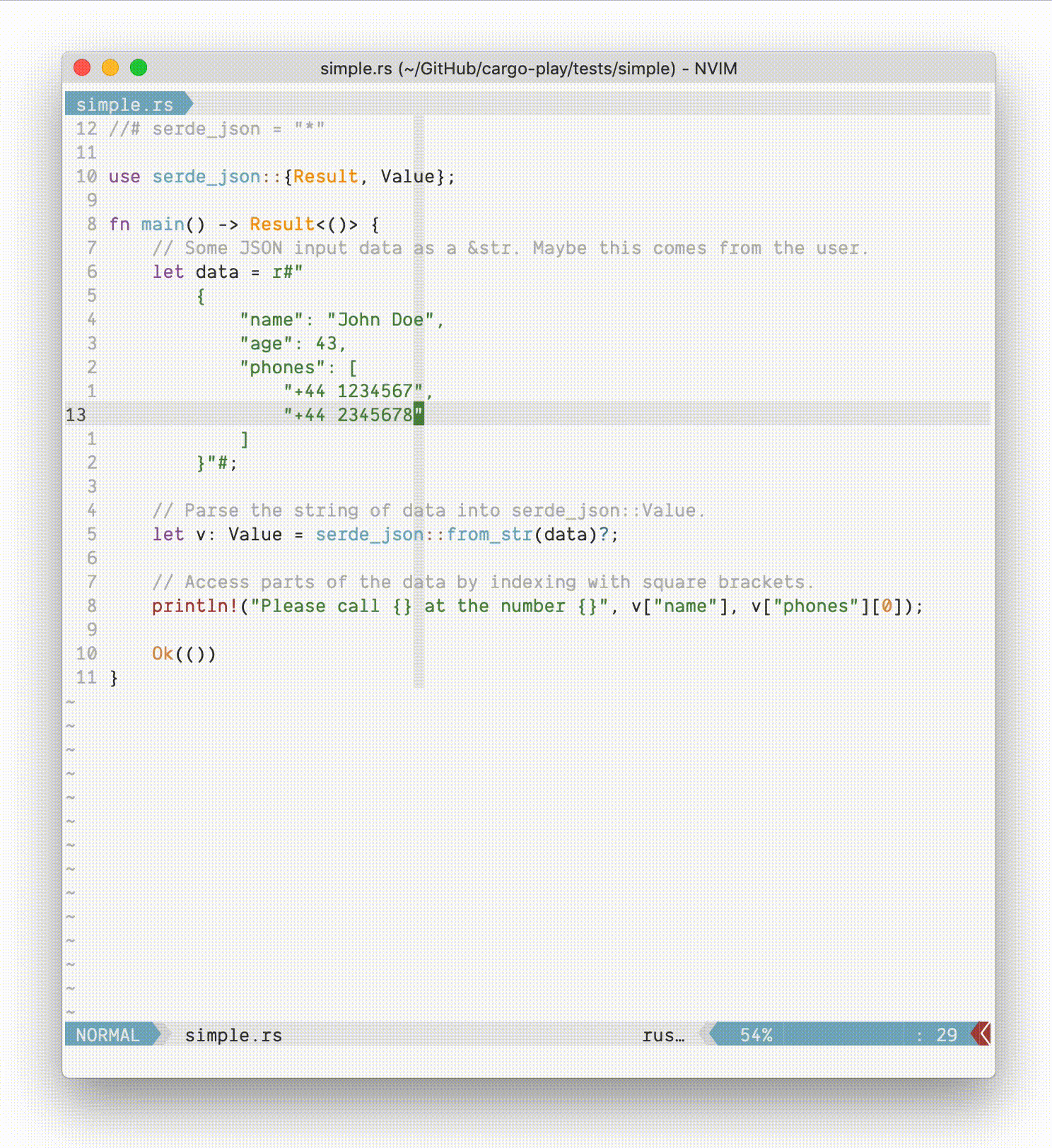mirror of
https://github.com/fanzeyi/cargo-play
synced 2024-11-10 05:04:13 +00:00
No description
| fixtures | ||
| recordings | ||
| src | ||
| tests | ||
| .gitignore | ||
| .travis.yml | ||
| Cargo.lock | ||
| Cargo.toml | ||
| LICENSE | ||
| README.md | ||
cargo-play
cargo-play is a tool to help you running your Rust code file without manually setting up a Cargo project.
See it in action

Install
cargo install cargo-play
Usage
Simply running cargo play <files> is sufficient. You can specify your external dependency at the
beginning of your file with the prefix //#. It accepts the same TOML syntax as in Cargo.toml.
Example
$ cat serde_json.rs
//# serde_json = "*"
use serde_json::{Result, Value};
fn main() -> Result<()> {
// Some JSON input data as a &str. Maybe this comes from the user.
let data = r#"
{
"name": "John Doe",
"age": 43,
"phones": [
"+44 1234567",
"+44 2345678"
]
}"#;
// Parse the string of data into serde_json::Value.
let v: Value = serde_json::from_str(data)?;
// Access parts of the data by indexing with square brackets.
println!("Please call {} at the number {}", v["name"], v["phones"][0]);
Ok(())
}
$ cargo play serde_json.rs
Updating crates.io index
Compiling serde v1.0.91
Compiling ryu v0.2.8
Compiling itoa v0.4.4
Compiling serde_json v1.0.39
Compiling gvzcg8yviqmd_euq3xti4-zbkrs v0.1.0 (/var/folders/nq/608n9lcx02n_mzx33_3z5wyw0000gn/T/cargo-play.GVzCg8yviQmd_EUq3Xti4-ZbKRs)
Finished dev [unoptimized + debuginfo] target(s) in 10.23s
Running `/var/folders/nq/608n9lcx02n_mzx33_3z5wyw0000gn/T/cargo-play.GVzCg8yviQmd_EUq3Xti4-ZbKRs/target/debug/gvzcg8yviqmd_euq3xti4-zbkrs`
Please call "John Doe" at the number "+44 1234567"
It also supports running multiple files at the same time:
$ cat tests/multi/entry.rs
mod hello;
fn main() {
println!("Hello {}", hello::world());
}
$ cat tests/multi/hello.rs
pub fn world() -> String {
"World".into()
}
$ cargo play tests/multi/*
Compiling qvsjdw04fxh5cgpdkdvg6ite_ak v0.1.0 (/var/folders/nq/608n9lcx02n_mzx33_3z5wyw0000gn/T/cargo-play.QVSJDw04FxH5CGpDkDvg6itE_ak)
Finished dev [unoptimized + debuginfo] target(s) in 0.30s
Running `/var/folders/nq/608n9lcx02n_mzx33_3z5wyw0000gn/T/cargo-play.QVSJDw04FxH5CGpDkDvg6itE_ak/target/debug/qvsjdw04fxh5cgpdkdvg6ite_ak`
Hello World
Files under sub-directories will be copied and placed relatively to the first file. Try:
cargo play tests/subdirs/**/*.rs
To Do
- Editor plugins
- Vim
- VS Code
- Toolchain supports
- Edition Support
Editor Support
Vim
Add this line to your .vimrc or init.vim:
command CargoPlay !cargo play %
With your code file open, running :CargoPlay will allow you to test your current file within an auto-generated cargo project.
Acknowledgements
This project is inspired by play.rust-lang.org and RustPlayground.